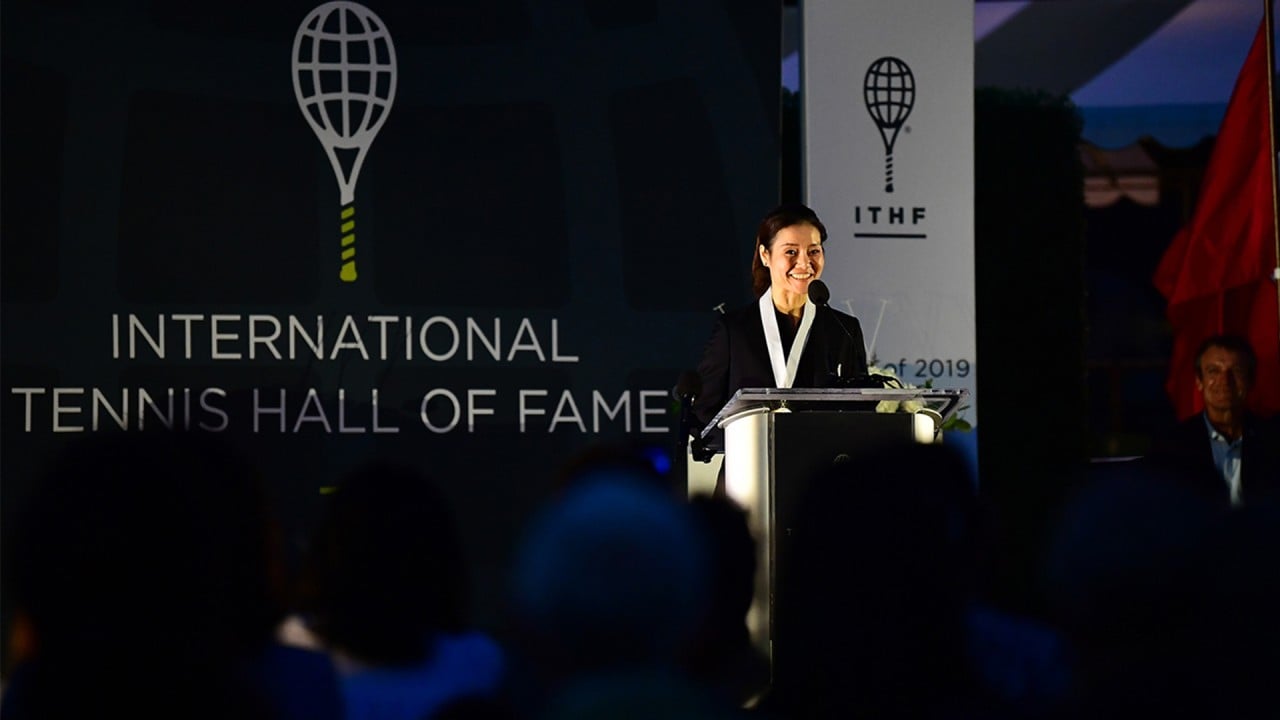
Chinese tennis has stalled since Li Na won French Open; Wang Qiang’s Tokyo 2020 stance shows unwillingness to ‘fly solo’
- Chinese No 2 Wang Qiang skips Wimbledon to focus on Tokyo 2020 – ‘Representing my country at the Olympic Games is the highest honour’
- Attitude at odds with two-time slam winner, who has fallen out of favour back home despite success on court
As a wide-open field saw four debutant slam semi-finalists become a final between Barbora Krejcikova and Anastasia Pavlyuchenkova, China’s players were nowhere to be seen.
Five entered the first round at Roland Garros and all five were sent packing by the end of the second round.
By the time the final was being played, most of China’s players were already getting knocked out of the Viking Open in Nottingham as they made the swing to the grass court season.
Chinese consulate slams ‘fake news’ Li Na has changed nationality
The other exception was the player that Zhang overtook as China’s No 1 last week with her Nottingham final run, Wang Qiang.
Wang will not be playing the grass season. Instead, she returned to China after her French Open defeat to Coco Gauff.
Maybe she was just sick of the sight of the American teenager, who had also beaten Wang in the final of the Emilia-Romagna Open in Parma, Italy, a fortnight before the French Open.
This year’s Wimbledon will take place from June 28, only ending on July 11 – just 13 days before the start of the Tokyo Games. That is a tight squeeze even before you start worrying about the possibility of quarantining in Japan after arriving from Britain.
Fair enough, you might think. It seems that world No 2 Naomi Osaka might not be playing at Wimbledon either after her contretemps with the French Open suits over media duties and mental health, while even the sainted Roger Federer pulled out in Paris essentially saying he’d rather save himself for grass.
Li Na’s French Open win opened the door for Chinese and Asian tennis
But Wang’s move hints at why there might not have been another Li Na in the decade since the Tennis Hall of Famer smashed expectations and caused a racket for Asian tennis.
“After considering the pandemic quarantine protocols and the Chinese national team’s schedule, I’m sorry to announce that I have decided to withdraw from the remainder of the grass season, including Wimbledon, and to return to China to prepare for the Tokyo Olympic Games with the rest of the national team,” Wang posted on social media.
“Representing my country at the Olympic Games is the highest honour,” she added.
Volleyball superstar Zhu Ting did it when she swapped being the highest paid player in the game and winning the biggest trophies with VakifBank Istanbul for Tianjin.
Footballer Wang Qiang did much the same when she swapped Paris St-Germain, where she had played in the Uefa Women’s Champions League, for a return to Wuhan in the Chinese Women’s Super League.
Slam or superstar – what’s next for Chinese tennis?
Being fair, Zhu has shown her nationalist chops before, notably covering up Japanese flags in photographs, while Wang has since said that she was unhappy in Paris and was not forced to return to China. Both may yet be proved right in Tokyo if China wins medals.
What’s for sure is that the attitude is at odds with maverick slam winner Li, the Party-pooper in chief.
Famously, Li was the reason for the “flying solo” era of Chinese sport, whereby athletes were granted more freedom from the state system and what went with it.
Li flew solo and flew highest, not only winning in Paris in 2011 but also lifting the Australian Open crown in 2014. The one-time world No 2 was inducted into the Tennis Hall of Fame in 2019 – becoming the first Asian player – and provided an inspiration for countless players, including Osaka.
She has not been so inspirational in China where she remains something of a controversial figure. In March, Chinese netizens turned on Li when the China distribution rights for the film of her 2013 autobiography, ‘My Life,’ were sold.
Many social media users called for a boycott of the film over the accusations that Li once tried to defame the China’s People’s Liberation Army (PLA) in a social media post.
How Li Na plans to nurture China’s tennis champions of tomorrow
It will be tough for Li to achieve her ambition for the film – “It would be great if girls and young women would be inspired after watching the movie”, she told CNN in 2o19.
Filming wrapped on the biopic, directed by Hong Kong filmmaker Peter Chan, back in 2019 but it still has no release date. Maybe it will never see the light of day, especially if it really catalogues Li standing up to the state sports system.
The days of flying solo seem long gone and with it the chance of a slam win for Chinese players any time soon.


